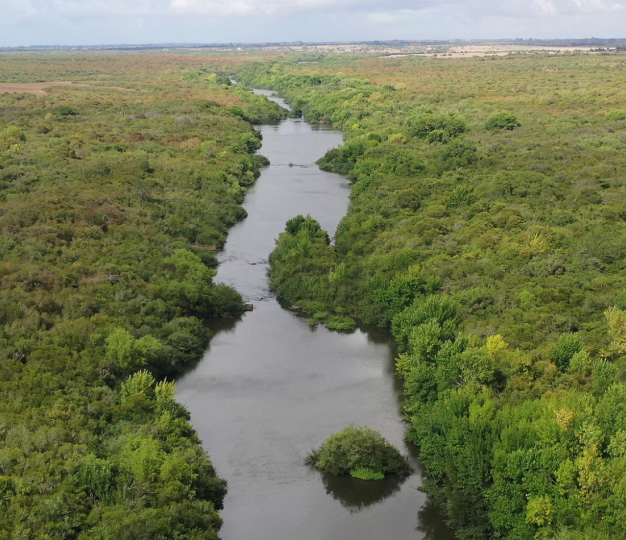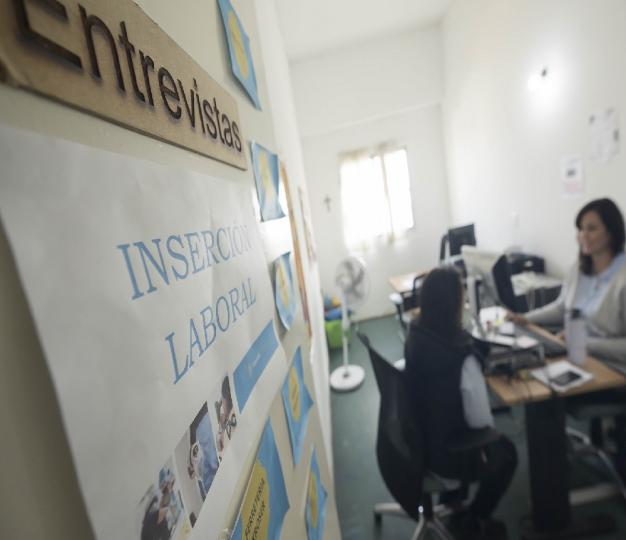EU Projects with Uruguay
The European Union's cooperation with Uruguay is now a mature, two-way cooperation, focused on issues of common interest to both parties.
Through its regional programmes, the EU facilitates technical assistance and exchanges of experiences, between the European Union's Member States, Uruguay and other countries of the region, on issues that matter to us, such as the green transition, security, gender equality, social cohesion, human rights and democracy.
The EU cooperates with the Uruguayan Government in the definition and implementation of public policies in areas of shared interest. It also cooperates through a number of projects with diverse civil society and local government actors, who are key in development and governance.
The Global Gateway Investment Agenda is a key factor in the cooperation with Uruguay, supporting and prioritising European investments in areas of importance for the country's development. Within this framework, the EU fosters projects in priority areas for Uruguay.
THE GREEN TRANSITION
The EU and Uruguay are like-minded partners when it comes to 'greening' our economies. We have committed to making our food systems more sustainable and working towards carbon neutrality. Within the European Union, we have the European Green Deal as a guide, in addition to other complementary strategies and plans, such as From Farm to Fork and the Action Plan for the Circular Economy.
REGIONAL PROGRAMMES
Within the framework of our 'green' cooperation, it is worth highlighting the following regional programmes, with highly relevant actions for Uruguay:
This is the EU's flagship programme on environmental sustainability and climate change with Latin America. Through this programme, Uruguay has been supported in strengthening its climate governance and the design, updating, and implementation of climate policies, as is the case of the Long-Term Strategy for Development Low in Greenhouse Gas Emissions and Climate Resilient. Additionally, together with Member States agencies, we support the following projects: Sustainable Urban Mobility (electromobility), Integrated Water Management, Information System for Droughts (multi-country; it includes Argentina, Brazil, Chile, Paraguay and Uruguay), Coastal Planning and Resilient Family Farming. In the new phase of EUROCLIMA, which began in January 2023, Uruguay will implement an initiative on Sustainable Livestock, for an amount of 3 million euros.
This programme seeks to promote sustainable growth and job creation in Latin America. Its objective is to support the transition towards a low-carbon, resource-efficient and more circular economy, to facilitate the implementation of sustainable production models. It has a budget of 33 million euros and a duration of 48 months. It began in December 2021 and will end in November 2025. The programme is divided into three components that work, respectively, with Latin American SMEs (Comp. 1), public institutions in the region (Comp. 2) and the management of intellectual property rights (Comp. 3).
PROJECTS IN URUGUAY
The EU also backs projects which involve civil society organizations, local authorities and business associations, on the topics such as waste management, circular economy and sustainable growth:
- CoopsUYxDS
This project, whose full title is 'Cooperatives promoting sustainable consumption and production as a strategy to face the post-COVID-19 crisis and deepen sustainable economic development in Uruguay', is led by the Uruguayan Confederation of Cooperative Entities (CUDECOOP), in association with the Uruguayan Cooperative Center, the National Commission for Rural Development, the Federated Agricultural Cooperatives, the Federation of Production Cooperatives and the Uruguayan Federation of Cooperatives. Its objective is the promotion of sustainable economic development. It has is co-financed by the EU with 500,000 euros.
- Innovation and Sustainable Development of the industry for mechanical transformation of wood.
This initiative is included in the "Development in Transition" project, implemented by the Uruguayan Agency for International Cooperation. It is coordinated by the Ministry of Industry, Energy & Mining and is co-financed by the EU with 203,612 euros. The action seeks to develop an innovative business model based on the principles of circular economy for the valuation of waste and by-products of the woodworking industry.
- Green Impulse
This initiative, whose full title is 'Creation of a Circularity and Industrial Symbiosis Hub for the incorporation of sustainable, innovative and associative practices in industrial companies in Uruguay', is implemented by the Uruguayan Chamber of Industries and is carried out within the framework of Component 1 of the Green AL INVEST programme. Its objectives are: 1) for industrial MSMEs to incorporate environmental sustainability into their operations, through the development and improvement of products, processes and models business circulars; and 2) that companies make efficient use of their resources through actions of Industrial Symbiosis at an intersectoral level and in the different value chains. It is co-financed by the EU with 300,000 euros.
- InsPYraME UE 2.0
The National Chamber of Commerce and Services and EUROCAMARA come together to implement the InsPYraME EU project, now in its second phase, to promote sustainable production and consumption processes of Uruguayan MSMEs, with a focus on women and youth, to take advantage of the opportunities that will offer the EU-MERCOSUR Agreement.
- Comprehensive Waste Management and Circular Economy. Institutional Strengthening and Good Practices
A very significant project carried out by Uruguay's Congress of Mayors began in March 2023, in association with the National Development Agency (ANDE). It has an EU contribution of 800,000 euros, and aims to improve waste management with reduced climate and environmental impact and to promote circular economy. The initiative is key to accompany Departmental governments in this complex task, through the preparation of local waste management plans and the development of an information system that feeds public policies on the subject at the local level, among other training activities and exchanges of experience.
SECURITY
In the field of Security and Justice, the European Union finances different regional and global programmes, in which Uruguay actively participates.
Programme EL PAcCTO has regional impact against transnational organized crime. It fosters bi-regional dialogue and joint work between Latin America & the Caribbean and the European Union. The programme, which begins its second phase in 2023, with a EU contribution of 58 million euros, has three components: police, judicial and prisons.
The COPOLAD programme, with a EU contribution of 15 million euros, focuses on supporting the drug policies of the countries of the region. In the case of Uruguay, the coordinating entity for this initiative is the National Drug Board.
In a complementary way, Uruguay also participates in several initiatives of the EU Global Illicit Flows Programme, such as SEACOP (on maritime drug control) and COLIBRI, more focused on civil aviation.
GENDER EQUALITY
The promotion of gender equality is transversal in the European Union's foreign affairs, as is specified in our Gender Action Plan (GAP III).
Specifically, within the framework of EU cooperation with Uruguay, we currently support several initiatives, totalling around 2 million euros, whose main aim is to contribute to the empowerment of women in the country.
gender violence:
- For peaceful coexistence
Implemented by the Center for the Promotion of Human Dignity (CEPRODIH), this project expands the capacity to care for women in situations of gender violence, developing a comprehensive program that contributes to guaranteeing their social and economic inclusion and, therefore, improves the conditions of life of the whole family. It has a EU contribution of 400,000 euros.
- Entramadas
Coordinated by FLACSO, this project encourages local civil society organizations in the Departments of Artigas, Rivera, Tacuarembó and Cerro Largo to provide responses adapted to the local reality for the protection and respect of the rights of women in Uruguay. It has a EU contribution of 400,000 euros.
- Collective autonomy against gender violence
This project contributes substantially to the eradication of gender violence in Uruguay. It is being developed by NGO El Paso and has a EU contribution of 396,000 euros.
Economic and social rights:
- Sustainable personal, social and institutional development for women deprived of liberty
Implemented by CLAEH University, this project contributes to improving the situation of vulnerability and reinsertion of Uruguayan women through the strengthening of civil society, public institutions and the involvement of the private sector, from a rights and gender perspective. It has a EU contribution of 450,000 euros.
- InsPYraME UE 2.0
The Uruguayan Chamber of Commerce and Services and Eurochamber Uruguay have begun the second phase of this project, which promotes sustainable production and consumption processes of Uruguayan MSMEs, with a focus on women and youth. It has a EU contribution of 450,000 euros.
- Women and ICTs
This initiative is included in the 'Ease of Development in Transition' project implemented by the Uruguayan Agency for International Cooperation (AUCI). The action is in the field of digital technologies, is coordinated by the National Employment Directorate, and fosters the labour insertion (or reinsertion) into the IT sector of women residing in the interior of the country. It has a EU contribution of 115,000 euros.
Participation and leadership:
- Strengthen, Participate, Influence
This project, implemented by the National NGO Association (ANONG), aims to strengthen the active and positive participation of organized civil society, with special focus on contributing to gender parity in the spheres of participation and decision-making of civil society organizations in the sustainable development process. It has a EU contribution of 400,000 euros.
SOCIAL COHESION
- EUROSOCIAL
This is one of the European Union's flagship cooperation programmes with Latin America. In 2022, a first phase of the program, EUROSOCIAL+, concluded, and a follow-up phase was prepared, which will begin in 2024. During the 15 years of implementation of this programme, it has contributed to the reduction of inequality, the improvement of the level of social cohesion and the institutional strengthening of 19 Latin American countries, by supporting their processes of design, reform and the implementation of public policies, focusing their action in the areas of gender equality, democratic governance and social policy. In Uruguay, it is worth highlighting the work carried out in the fields of education and employment. It also worked with the National Institute for Women on gender policies.
- Strengthen, Participate, Influence
In terms of social cohesion, the participation of civil society is also fundamental, which is why the EU seeks to strengthen civil society organizations and their key role in the development and governance of the country. In addition to financing several initiatives implemented by civil society organizations, mainly on environmental and gender issues, EU support for civil society through this project, which is implemented by the National NGO Association (ANONG), aims to strengthen the active and positive participation of organized civil society, with special focus on contributing to gender parity in the spheres of participation and decision-making of civil society organizations in the sustainable development process. It has a EU contribution of 400,000 euros.
DEMOCRACY AND HUMAN RIGHTS
The defence of human rights and the strengthening of democracy are fundamental issues for the European Union. In the case of Uruguay, which has very positive indicators in these areas, the EU focuses its dialogue and work on issues such as gender violence and the situation in prisons.
In 2023, work began with the Uruguayan Parliament, through two initiatives implemented by the intergovernmental institution IDEA International, to strengthen its link and dialogue with citizens, to improve parliamentary capacity for anticipatory governance, and to ensure greater regional and global participation of the Uruguayan Parliament in sharing lessons and experiences with other parliaments.
Additionally, civil society is being helped through support for the National NGO Association (ANONG) in conjunction with the local United Nations Office, to strengthen the capacity of civil society to review reports and the presentation of its observations, within the framework of the new exercise for Uruguay of the Universal Periodic Review (UPR) of Human Rights.




